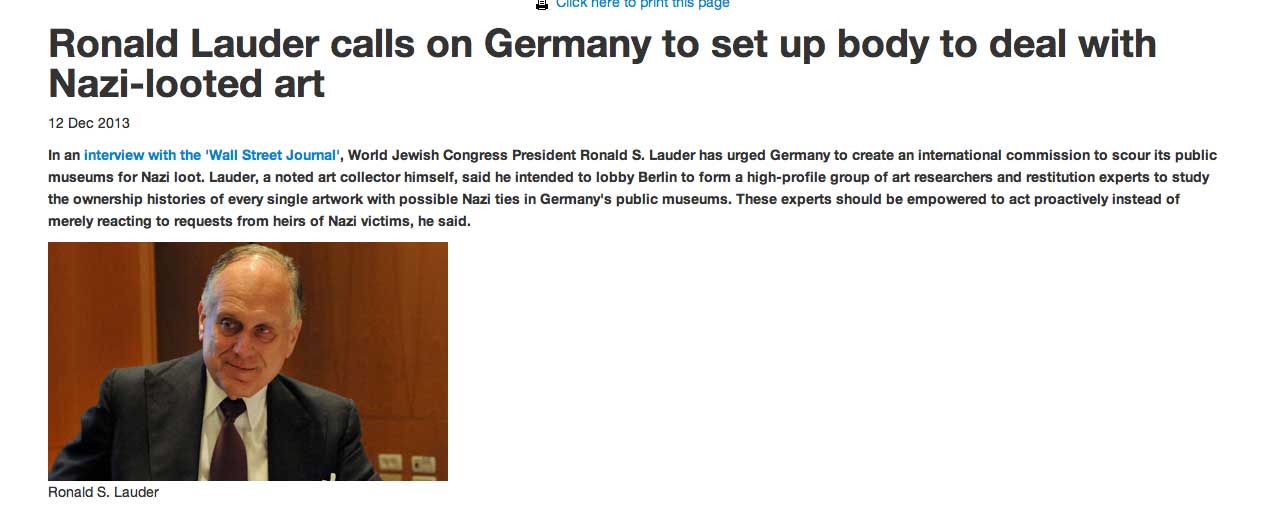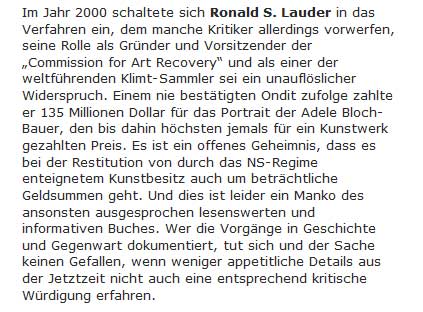

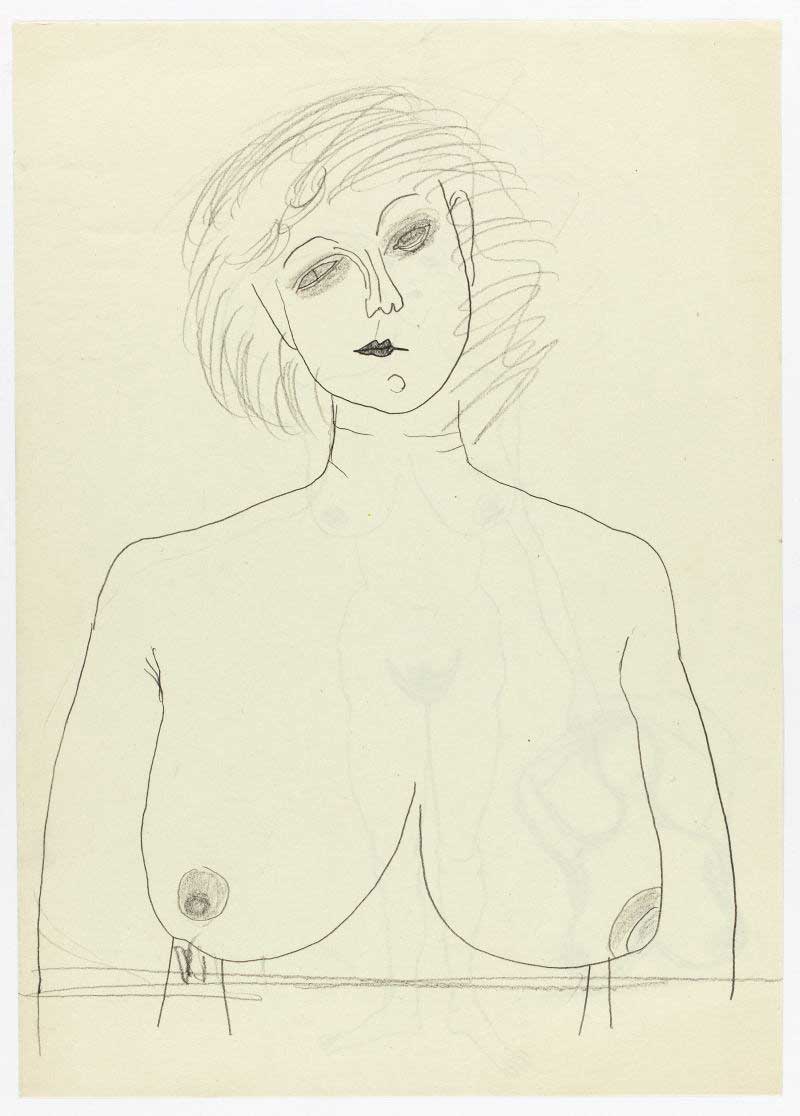
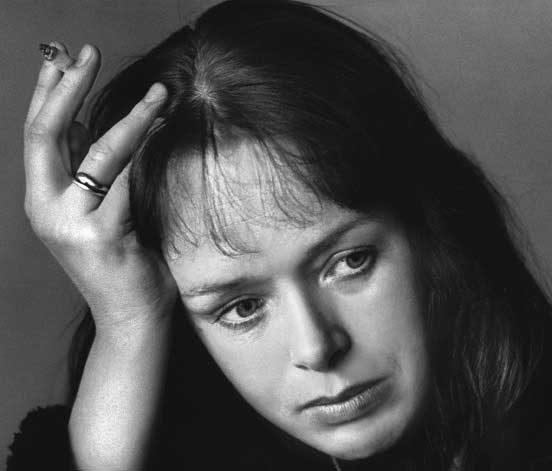
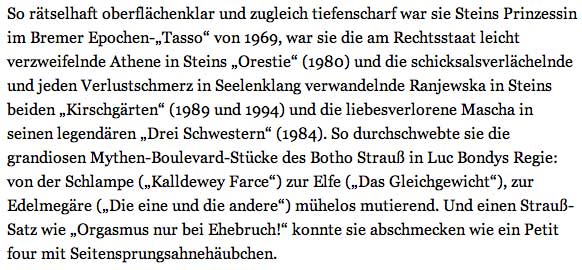
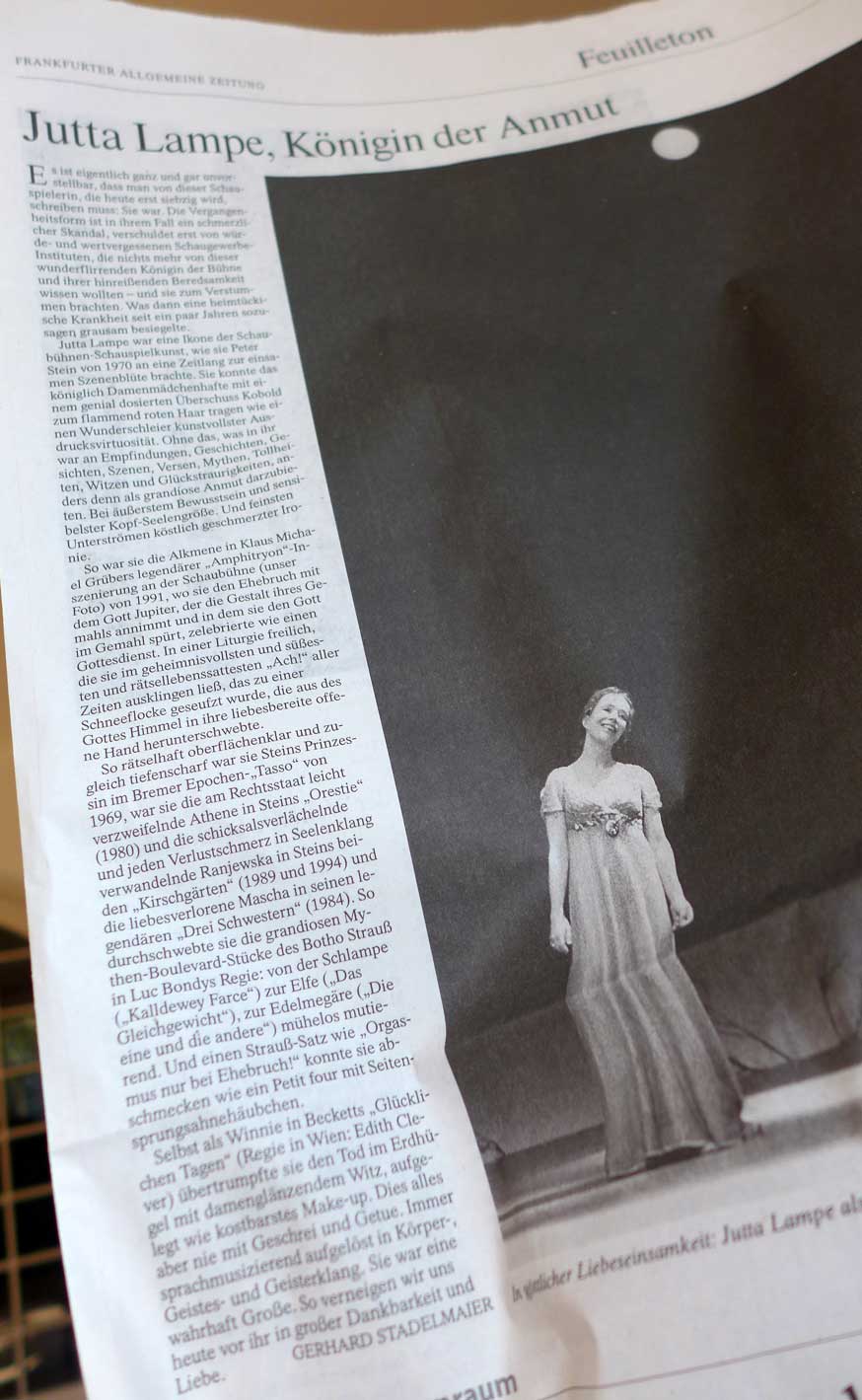
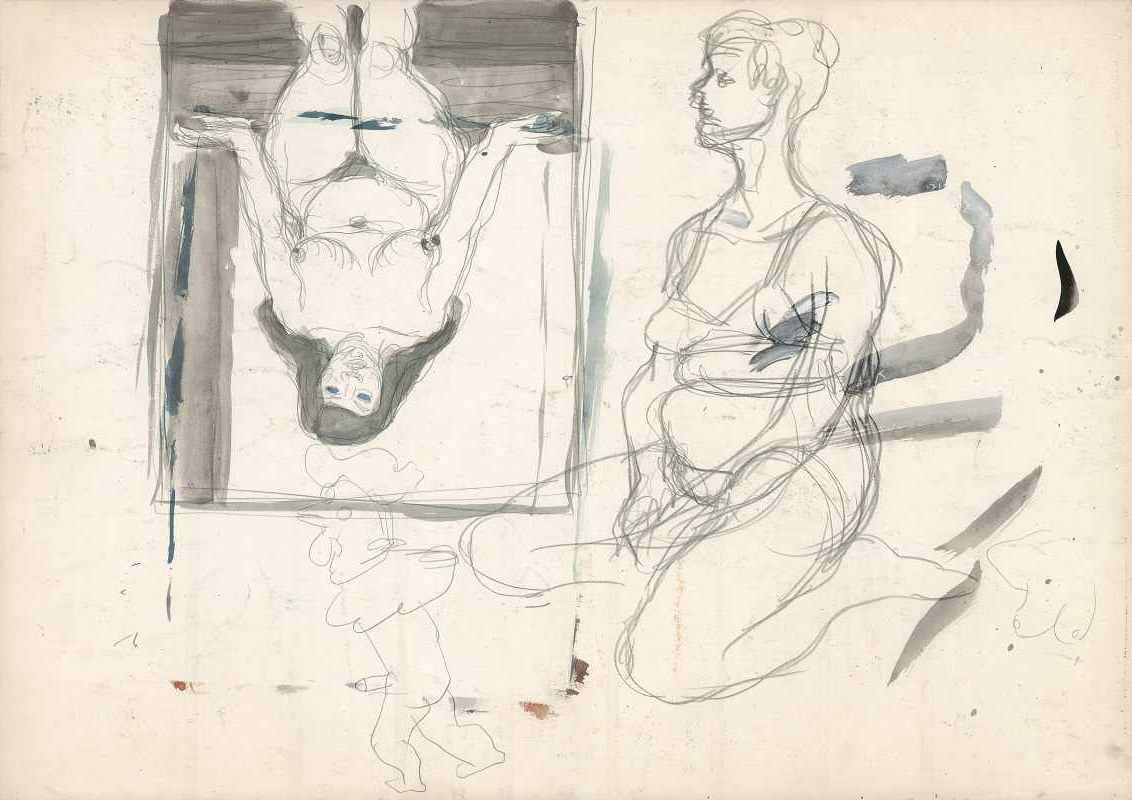
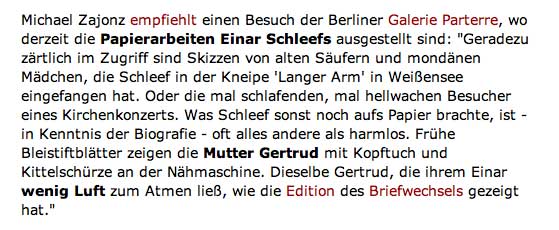
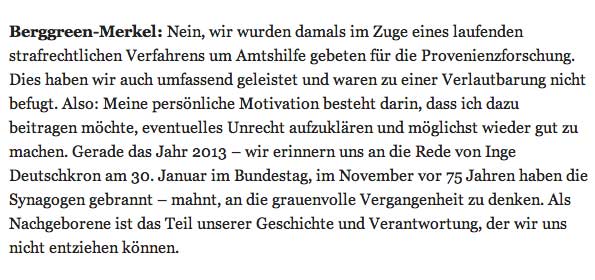

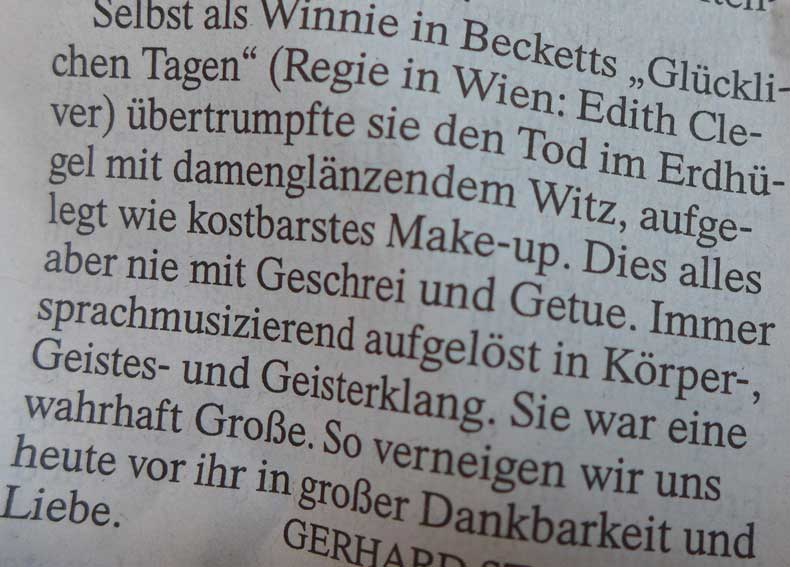
Vorsicht.
Um was es geht. Nicht um Rechte von Erben, um Opfer, und Besitz. Nach 80 oder 100 Jahren. Aber um Kunst zwischen Himmel und Erde, für alle und um das Land, woher es kommt. Wofür wir tätig sind, heute bei uns. Wie andere bei sich. Dass man gerne kommt und hinfährt und wir was haben. Was hier entstand. Allen. Dafür. Der Auftrag. Unserer Geschichte. Sie ist eine unter Agenten, Funktionären anderer Länder und hat zu sorgen, dass dem Land für das sie steht, das hier Entstandende fruchbar wird und produktiv. Auch den Erkenntnissen, und die sind nicht immer erfreulich. Wenn man uns die nimmt,gerade dort in der Kunst, der gemeinsamen Geschichte wie sollen wir je zu uns kommen.
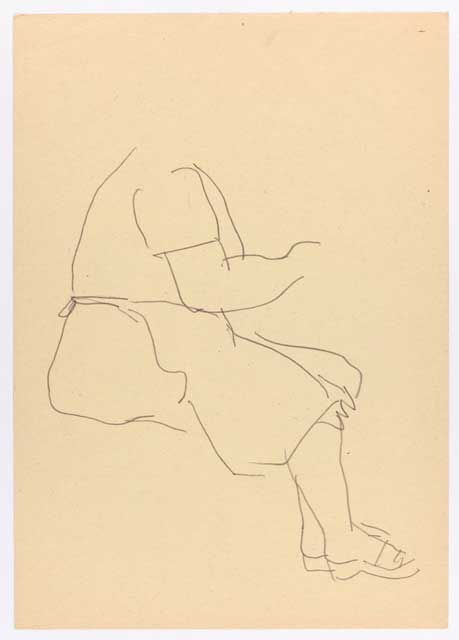
Vorsicht.
In des Teufels Küche gekommen. Es wären die unerwünschten falschen Erkenntnisse. Wenn der Eindruck entsteht. Ein Teufelspakt. Sie gaben in der Not, nahmen für ein Butterbrot und ein Ei. Und nun, nach 100, nach 80 Jahren, Kriege und auf und ab, gehts um Millionen, die sie draus gemacht, einfordernd, dorthin, wofür es nie gemacht wurde, alles über Grenzen Über Ozeane, in ferne Länder. Mit Anwälten und Uniformierten und Pressionen zu Rechtbeugungen und -Brüchen. Zu Tode gehetzt. Geschäfte, die man nicht machen sollte. Partner der Ohnmacht. Finger weg. Fernhalten von solchen Partner und Märkten. Dass es nicht zum Untergang wird grandioser Kulturen.Was auf dem Spiel steht ist viel. Die Sternstunde des Glücks, der Kulturen, der gemeinschaftlichen. Wer es auseinanderdividiert, zu geschäflichen Zwecken, macht sich schuldig. Das ist mehr als ein Kapital-Verbrechen.
Germany, unlike some European countries, has yet to engage in a systematic reckoning of its public art holdings since World War II, preferring to wait until heirs of Jewish families come forward with lost-art claims. Lauder said such an effort could turn up far more stolen art than the recently disclosed trove of 1,400 works found in the Munich apartment of Cornelius Gurlitt, the son of Hildebrand Gurlitt who sold a lot of looted art on behalf of the Nazis during World War II.
"More than 20 million artworks were stolen during the war, and many of them are still hanging in German museums," the WJC president told the newspaper, adding: "We have not seen the will of the government to comb through its own collections."
The 'Wall Street Journal' quoted a person close to German Chancellor Angela Merkel that the government in Berlin was willing to hear Lauder's proposal, but that Germany's federal structure and the government's lack of direct oversight of regionally governed public museums could make it difficult for Berlin to impose outside scrutiny of their collections.
Ingeborg Berggreen-Merkel, the restitution expert overseeing the Gurlitt task force, said her group must abide by Germany's laws concerning looted art and has no extra mandate to force Mr. Gurlitt to return any work--even if its members were to uncover conclusive proof that his pieces were stolen from Jewish families.
"That is a political question and has nothing to do with my work," she was quoted by the newspaper as saying. Her group will report to the local Bavarian prosecutor handling Gurlitt's case and not to the federal government. The person close to the chancellor said the German leader supported the work of the Gurlitt task force but acknowledged that under current German law, Gurlitt couldn't be compelled to give back his art, stolen or otherwise. The government would welcome suggestions on how to overcome this legal "weak point," this person said.
WJC president: 1990s Swiss banks' commission could serve as model for solving art restitution
Lauder said one of his major complaints with the Gurlitt task force was that it had not disclosed the identity of its experts, which could undermine the art world's confidence in the group's findings. Meanwhile, Berggreen-Merkel said that she did not currently plan to identify the committee's ten members but was in the process of enlisting internationally recognized experts. She said that two experts from France and Israel had already agreed to join and that she was in talks with an American. None of the members of the task force would come from auction houses or galleries because the task force "has a research and not a market focus," she added.
Lauder said the Gurlitt task force's fitful beginnings illustrated the need for a larger body empowered by the government to comprehensively scour museums for Nazi loot yet also operate independently and with greater transparency--a commission similar to the one the Austrian government created in 1998 to sift through its own museums. Since then, Austria has processed about 300 cases involving art restitution - a sizable bump from the seven cases that have churned through Germany's Limbach Commission, an official body created in 2003 to mediate Jewish families' claims to artworks held by German museums. That commission can only handle cases if both the family with a potential claim and the museum agree to go before it and cannot independently investigate the origins of artwork.
What the Limbach Commission needed, Lauder told the 'Wall Street Journal', was an auxiliary body that could ferret out and research potential claims arising from its museum collections, rather than wait for heirs to discover the art's existence on their own and bring a claim to Limbach or the courts. "Right now, if curators or directors in Germany know they've got a Van Gogh that might be stolen, they're hostile about confessing as much and keep it in the basement," he said. "A renewed effort and an effective program is the order of the day."
Lauder said his proposed commission could be modeled after the commission set up by the Swiss government in 1996, when it agreed to open and reallocate Holocaust victims' dormant bank assets. At the time, the Swiss parliament formed a nine-member Independent Commission of Experts that ultimately researched thousands of claims made by Holocaust heirs for money stored by Jewish war victims in Swiss bank vaults. The commission included experts from the different countries working alongside Swiss bankers and lawyers.
The Swiss government ultimately paid around US$ 15 million to fund the commission before it reallocated all the money it could find and was disbanded in 2002. Lauder said the current problem required a similar approach and that the effort should be financed by the German government.
